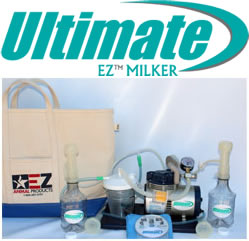Taken from an article by Owen Hembry, “Blood is thicker than water, after all.”
Article from:
New Zealand Herald (Auckland, New Zealand)
February 8, 2009
MILKY FINDINGS:
Anyone hoping that a study by the European Food Safety Authority would settle once and for all the argument surrounding the safety of A1 and A2 milk will be disappointed with the report’s release last week. The A1 beta-casein gene is carried by about half of New Zealand cows and has been linked by some people to heart disease, diabetes and schizophrenia.
The science and arguments relating to A1 and A2 milk has led to disputes and investigations, including a study here in 2004 which university professor Keith Woodford in October 2007 accused of having an outcome predetermined by our Food Safety Authority. Woodford said the authority changed the outcome to one of certainty and then took an approach of sustained misinformation. The authority said it would commission an independent review of its risk management framework and the science behind the debate. Last April, a report by Swedish scientist Stuart Slorach was critical of the authority for its handling of the 2004 review but praised its handling of other food safety issues.
In February 2008 the then Food Safety Minister Lianne Dalziel said the European decision to hold a review meant it was no longer necessary for the New Zealand Food Safety Authority to commission a scientific study. Depending how you interpret last week’s European report, that may or may not still be the case. Dr Andrew Clarke, chief strategic and scientific officer at A2 Corporation – which owns and licenses intellectual property for identifying cows, producing and marketing milk with the A2 beta-casein protein – says he is pleased with the report and agrees that more data is needed. The European Authority identifies that further data is required to quantify or determine risk and thus no recommendations can be made in regard to calculating risk assessment, the company says. “Such research will not only provide the data required to proceed with analysis and risk assessment, but will serve to identify segments of populations to which it is relevant,” Clarke says. The conclusion to the report includes statements that some ecological studies linking BCM7 (a peptide sequence present in milk protein Beta-casein) to insulin dependent diabetes mellitus could not provide a proper base to demonstrate a cause and effect relationship. It said there was no strong evidence for a link between the consumption of B-casein A1 and an increased risk for cardiovascular disease. “Based on the present review of available scientific literature, a cause-effect relationship between the oral intake of BCM7 or related peptides and aetiology or course of any suggested non-communicable diseases cannot be established,” the report said. “Consequently, a formal EFSA risk assessment of food-derived peptides is not recommended.” However, A2′s Clarke says it may not have found strong evidence of a link to cardio-vascular disease but the European Authority still found evidence. “When you see statements out there [saying], ‘No link found or there is no link’, that’s actually a misrepresentation,” Clarke says. “There’s a link there – how strong it is is up for debate. What needs to be done from here? More research.”
A spokesman for Food Safety Minister Kate Wilkinson says the minster will be briefed on the European report today and seek advice on the next step. It would appear the argument is still far from over.
Following are a letter to the editor and a reply to that letter from the European Journal of Clinical Nutrition:
A2 Critique Review (letter to the editor)
Reply to previous letter
Here is a presentation reviewing the literature, The Devil’s In The Details.
http://www.nodpa.com/a1_a2.pdf


